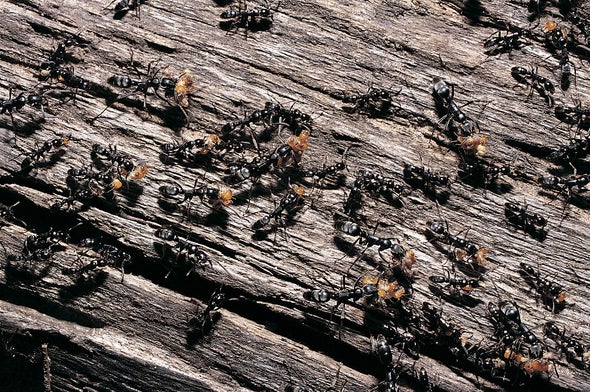(单词翻译:单击)
听力文本
This is Scientific American — 60-Second Science. I'm Lucy Huang.
It's peak cold and flu season, which means taking a lot of preventative measures. Frequent hand-washing is a must. As is avoiding co-workers or friends who are sick. But we humans are not the only animals that change behavior to keep diseases at bay. So do ants.
"So there are the foragers and the nurses — it's two different groups of work."
Nathalie Stroeymeyt of the University of Lausanne. She and colleagues observed ants to see their reaction to the presence of a pathogen.
"With the nurses staying inside the nurse taking care of the brood and being made of young workers typically. And the foragers are all the workers at outside of the nest to collect food and defend the territory."
Forager ants are at greater risk of getting exposed to diseases because they leave the safety of the nest. So the researchers sprayed a common fungus on a small group of forager ants and then followed their movements to see the way other ants reacted.
"We marked all ants in the colony with individual labels, which carries these two-dimensional bar code marks like QR code which is automatically detected and recorded using a tracking system."

After the infection, the nurse and forager ants stayed within their cliques and interacted less outside of their work group. The researchers also saw that forager ants spent more time outside of the nest.
"They increase that amount by 15 percent so by quite a long large amount."
The researchers also measured the amount of fungus on each ant and saw that it was almost completely contained to the foragers group. Some nurse ants and even the Queen did have trace amounts of the fungus' spores on them but the amount was small enough that they could easily groom them off of their bodies. The study is in the journal Science.
Not only does the cliquish behavior stop the spread of the fungus, "but it allows you to develop immunization. Something that's quite interesting in these ants that's been shown by other study is that when you receive very small amount of these spores, you don't have an increase in mortality risk because it's low enough that you can heal, it's sort of boost your immune defenses and protect you against later exposure to the same pathogen."
Seems that in their ability to avoid infecting other members of the community, ants may be more advanced than we are.
Thanks for listening for Scientific American — 60-Second Science. I'm Lucy Huang.
参考译文
这里是科学美国人——60秒科学。我是露西·黄。
现在是感冒和流感的高峰季,这意味着我们要采取多项预防措施。必须勤洗手。同时避免接触生病的同事或朋友。但我们人类并不是唯一通过改变行为来控制疾病的动物。蚂蚁也是如此。
“蚂蚁分工为觅食者和护理者,这是两个不同的工作组。”
洛桑大学的娜塔莉·斯特罗伊特说到。她和同事观察蚂蚁以了解它们对病原体的反应。
“护理蚂蚁通常由年轻的工蚁组成,它们待在蚁穴里,负责照看蚁卵。觅食蚂蚁则是到蚁穴外去采集食物和保卫领土的工蚁。”
觅食蚂蚁接触疾病的风险更大,因为它们离开了蚁穴这个安全地带。因此,研究人员将一种常见真菌喷在一小群觅食蚂蚁身上,然后追踪它们的移动路线,观察其它蚂蚁的反应。
“我们为蚁群中每只蚂蚁都标上了单独的标签,标签上带有类似条形码的二维条码标记,追踪系统可以自动检测并记录这些条码。”
感染真菌后,护理蚂蚁和觅食蚂蚁都呆在自己的圈子里,在工作组外的互动减少。研究人员还发现,觅食蚂蚁在蚁穴外的时间变长了。
“它们在蚁穴外的时间增加了15%,可以说这是相当长的时间了。”
研究人员还测量了每只蚂蚁身上的真菌数量,发现真菌几乎只包含在觅食组里。一些护理蚂蚁甚至蚁后身上都有少量的真菌孢子,但数量很少,它们可以轻松地将其从身上清除。这项研究发表在《科学》期刊上。
这种小团体行为不仅阻止了真菌的传播,“而且还让蚂蚁进化出了免疫力。其他研究也提到过的这些蚂蚁身上有趣的地方在于,当接触到的真菌孢子数量非常少时,并不会增加其死亡风险,因为孢子的数量足够少,所以蚂蚁可以自愈,这可以增强蚂蚁的免疫防御能力,在之后接触同一种病原体时能保护蚂蚁。”
看起来,在避免感染群体其它成员的能力方面,蚂蚁可能比我们更先进。
谢谢大家收听科学美国人——60秒科学。我是露西·黄。
译文为可可英语翻译,未经授权请勿转载!
重点讲解
重点讲解:
1. keep sb./sth. at bay 使…不能靠近;防止…侵袭;
Eating oranges keeps colds at bay.
吃橘子可以预防感冒。
2. take care of 照顾;照看;看护;
I take care of them to the best of my abilities.
我尽我所能地照顾他们。
3. be made of (由…)构成的;(由…)制成的;
All the bedding is made of simple, untreated cotton.
所有床上用品全部用未经处理的天然棉花制成。
4. get exposed to 接触;
We don't operate dangerous machinery, or get exposed to toxic chemicals.
我们并没有从事危险的机械操作,或接触有毒的化学物质。


